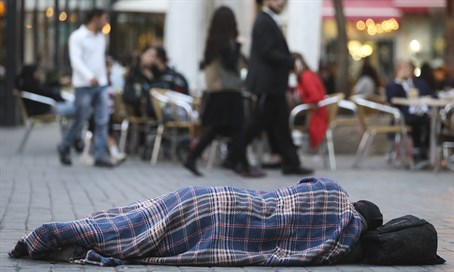
We have all read the terrible figures; around a third of Israelis live below the poverty line. I have had a lot of thoughts about this and would like to comments on a number of fronts.
Bernard Benny Berger – Poverty in Israel, some observations and some possible solutions
- Whilst I am a supporter of the right, both in terms of security and economics, I am not absolute in either regard. Being a supporter of the right in economic terms generally means being a supporter of market economics based on a free market in goods and services, however Israel has become an oligopolistic market dominated in many sectors by too few firms and a number of key families have assumed an economic power similar to their counterparts in Moscow, I.E. “The Oligarchs.” Food prices are for example around 25% higher than the European Union average.
- The Competition Authority therefore appears not to be doing an adequate job; this has to change.
- Both Lapid when Finance Minister and now Kahlon have not delivered the necessary economic relief to those who needed it in the above regard. What are Kahalon’s current plans to ensure that the economic divide not only stops growing but to a small degree actually shrinks?
- Clearly a growth in the income gap was inevitable with the development of the sunrise industries such as high tech, and those with the appropriate skills are indeed able to command a salary premium over those working in more conventional sectors, that to me is natural, it is the extent of the income inequality rather than income inequality itself that is disquieting.
- There are a number of worthy charities in Israel, some of my favourite examples are:-
- One Family Together, that works with families of people killed or severely in war or terrorism incidents.
- Yad Ezra ve Shulamit which helps the poor.
- Meir Panim, which performs a similar function.
- Lev la Lev, which is a girl´s orphanage.
- NACOEJ, which is a US-based fund to help students of Ethiopian origin to fund their high school and third level educational costs.
- I sense however that these and other very worthy causes that can indeed help to narrow the gap are insufficiently funded. Furthermore, there seems to be one the one hand a disconnect yet on the other hand a significant opportunity to seek sufficient ongoing funding from some of the wealthy Jewish entrepreneurs in Israel and the diaspora and furthermore to utilise the powerful networks that said individuals have to create a “snowball effect” and attract increasingly significant revenue flows as each year passes into the next.
- Within Israel, a few people come immediately to mind among others; all are immensely well-connected.
- Naftali Bennett, Head of haBayyit haYehudi, Minister of Education and software millionaire.
- Nir Barkat, Mayor of Jerusalem and software millionaire.
- Amir Gal On
- Beny Alagem
- Shai Agassi
- Yossi Vardi
- Outside Israel, names like Sheldon Adelson, the Bronfman Family and Haim Saban immediately come to mind, however there are many more in business circles, e.g. some of the senor NYC hedge fund managers, and in the acting world there are people like Natalie Portman, Adam Sandler, Michael , Barbara Streisand and Mayim Bialik and many others of Jewish origin with a commitment to Israel whose public endorsement of some of the needy Israeli charities could dramatically increase their profiles and hence potential annual revenues.
- Maybe the community, John Voight, Sylvester Stallone and Arnold Schwarzenegger are strong Israel supporters whose endorsement of some of these Israeli charities plus some donations could be wonderful.
- I am sure that all of the above do contribute to charity, my view is that to dramatically increase the flow of funds, they need to do it more publicly and pressurise those within their networks to do the same. Imagine the free P/R that the direct and very public involvement including the financing of advertising that the public involvement of these people and others in a similar situation could generate. It could transform fairly well-known charities into household names among the target market of potential wealthy philanthropists.
- One other problem is the Chief Rabbinate. Unlike the “glory days” of Shlomo Goren, the Chief Rabbinate today seems more obsessed with the finer minutiae of Halachic Law rather than the morality which the observance of such laws are meant to programme into all of, particularly including the most important act of Tzedakah. They chase converts to find them doing something outside Halachic Law and strip them and their descendants of their Jewish status, they collect outrageously high kashrut fees, making a huge effort to encourage a boycott of food outlets that are unwilling or unable to continue to pay the high daily supervision fee for what is at the most a few minute´s visit for normal as opposed to Glatt Kosher.
- Surely the Chief Rabbinate would be better occupied and assume a more easily-respected moral position at national level if they encouraged the payment of those who can well afford it of Tzedakah to those charities mentioned above and others, but not just those directly affiliated with the Chief Rabbinate. ´
- Just a few lateral ideas about how to tackle the growing social menace of poverty in Israel; either way the time to sit on the fence is over.
Bernard (Benny) Berger:
- He currently works in Ireland as an Aviation Specialist.
- Bernard Benny Berger – Poverty in Israel, some observations and some possible solutions









